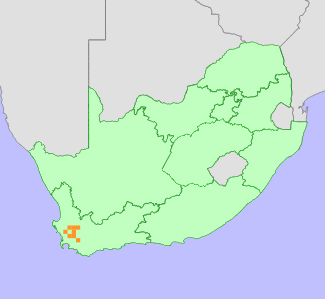|
Scientific Name | Babiana villosa (Aiton) Ker Gawl. |
Higher Classification | Monocotyledons |
Family | IRIDACEAE |
Synonyms | Babiana villosa (Aiton) Ker Gawl. var. grandis G.J.Lewis, Babiana villosa (Aiton) Ker Gawl. var. villosa |
Common Names | Rooibobbejaantjie (a) |
National Status |
Status and Criteria | Near Threatened B1ab(ii,iii,iv,v)+2ab(ii,iii,iv,v) |
Assessment Date | 2021/03/29 |
Assessor(s) | D. Raimondo, J.C. Manning & T. Patel |
Justification | This species has a limited distribution range, with an extent of occurrence (EOO) of 5822 km², and an area of occupancy (AOO) of 136 km². It is declining across its range due to ongoing habitat loss and degradation, but is still locally common in remnant fragments of renosterveld, occurring at more than 10 locations. Therefore, it nearly meets the thresholds for Vulnerable under criterion B and is assessed as Near Threatened. |
Distribution |
Endemism | South African endemic |
Provincial distribution | Western Cape |
Range | The species is endemic to South Africa and is found in the Tulbagh and Malmesbury Districts of the Western Cape. |
Habitat and Ecology |
Major system | Terrestrial |
Major habitats | Swartland Shale Renosterveld, Breede Shale Renosterveld, Swartland Granite Renosterveld, Breede Shale Fynbos |
Description | It occurs on clay or granitic gravel flats and slopes in renosterveld. Flowers are pollinated by hopliine scarab beetles. |
Threats |
| About 70% of this species' habitat is already irreversibly modified due to agriculture and urban development. Loss continues at a very low rate due to agriculture, especially vineyards and olive cultivation. Alien invasive plants (wattles, pines, silky needle-bush, syringa and gums) are a severe ongoing threat. Other threats include grazing and roadside disturbance. |
Population |
This species is locally common in renosterveld. From 2015, more than 15 new locations were recorded, however, the species is still threatened within its range. The current population size is unknown. However, a continuing decline is inferred from ongoing habitat loss and degradation.
|
Population trend | Decreasing |
Assessment History |
Taxon assessed |
Status and Criteria |
Citation/Red List version | | Babiana villosa (Aiton) Ker Gawl. | NT B1ab(ii,iii,iv,v) | Raimondo et al. (2009) | |
Bibliography |
Goldblatt, P. and Manning, J.C. 2000. Cape Plants: A conspectus of the Cape Flora of South Africa. Strelitzia 9. National Botanical Institute, Cape Town.
Goldblatt, P. and Manning, J.C. 2007. A revision of the southern African genus Babiana, Iridaceae, Crocoideae. Strelitzia 18:1-97. South African National Biodiversity Institute, Pretoria.
Goldblatt, P. and Manning, J.C. 2020. Iridaceae of southern Africa. Strelitzia 42. South African National Biodiversity Institute, Pretoria.
Raimondo, D., von Staden, L., Foden, W., Victor, J.E., Helme, N.A., Turner, R.C., Kamundi, D.A. and Manyama, P.A. 2009. Red List of South African Plants. Strelitzia 25. South African National Biodiversity Institute, Pretoria.
|
Citation |
| Raimondo, D., Manning, J.C. & Patel, T. 2021. Babiana villosa (Aiton) Ker Gawl. National Assessment: Red List of South African Plants version 2024.1. Accessed on 2026/01/31 |
 Comment on this assessment
Comment on this assessment

